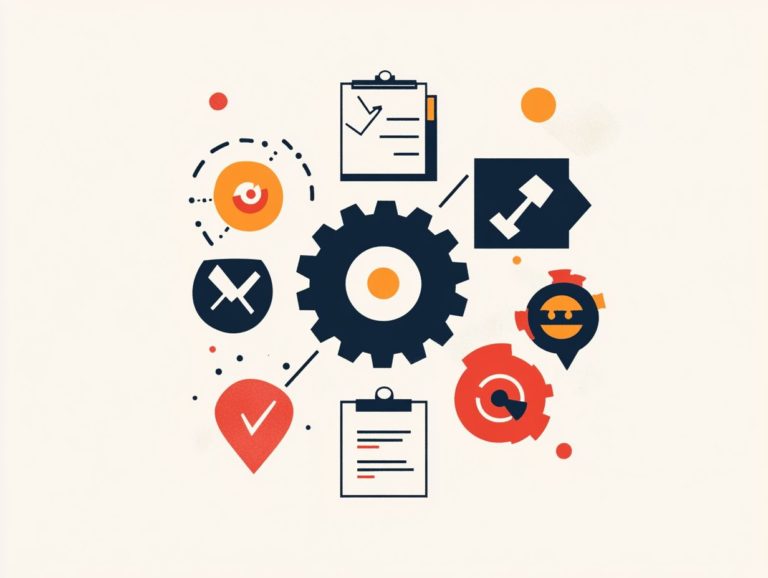how to create an effective project budget?
Creating an effective project budget is essential for the success of any endeavor. Whether you’re tackling a small initiative or managing a large-scale operation, understanding the budget is key.
Grasping the definition and significance of project budgets lays the groundwork for effective planning. This article will delve into the key components of a project budget and provide a step-by-step guide for crafting one.
You’ll also explore essential tools for tracking budgets and strategies for communicating financial plans to stakeholders. Equip yourself with the knowledge you need to master project budgeting!
Contents
- Key Takeaways:
- Understanding Project Budgets
- Key Components of a Project Budget
- Creating a Project Budget
- Step-by-Step Guide
- Tips for Effective Budgeting
- Best Practices and Common Pitfalls
- Tracking and Managing Project Budgets
- Tools and Techniques
- Communicating Budgets to Stakeholders
- Effective Communication Strategies
- Frequently Asked Questions
- What is the importance of creating an effective project budget?
- What are the key components of an effective project budget?
- How do I determine the project scope when creating a budget?
- What are some common mistakes to avoid when creating a project budget?
- What are some helpful tips for accurately estimating project costs?
- How often should I review and update the project budget?
Key Takeaways:

Define the project budget and emphasize its importance in the planning and execution process. Break down the project budget into cost categories and follow a step-by-step guide to create an accurate budget.
Utilize best practices and avoid common pitfalls to ensure the project’s success and communicate the budget effectively to stakeholders.
Understanding Project Budgets
Understanding project budgets is essential for mastering project management. This covers the entire lifecycle from initial planning to execution and closure.
By managing your budget effectively, you ensure resources are allocated wisely. Expenses are tracked meticulously, allowing financial resources to be utilized efficiently to achieve your project goals.
A well-organized project budget acts as a roadmap for all stakeholders. It guides them through various phases, including material procurement, labor costs, and operating expenses.
This structured approach simplifies budget tracking and variance analysis, enabling you to navigate the project with confidence.
Definition and Importance
A project budget is your detailed financial plan. It outlines the estimated costs associated with your project covering everything from labor costs to material procurement and operating expenses.
This financial blueprint not only sets realistic expectations for resource allocation but also serves as a crucial tool for effective project management. By creating a budget proposal, you establish a structured foundation that guides your team in making accurate project estimates.
A clearly defined budget becomes your benchmark for tracking project variance. This refers to the difference between what you planned to spend and what you actually spent.
It plays a vital role in measuring project progress and outcomes. This enables you to make informed decisions and implement strategic adjustments throughout the project lifecycle.
Key Components of a Project Budget
The key components of a project budget include a range of cost categories. These are essential for establishing a strong financial plan for effective project management.
Understanding these components helps you navigate your project’s financial landscape with clarity and precision.
Cost Categories and Breakdown
Cost categories within your project budget can be divided into labor costs, material procurement, operating costs, and other essential expenses. This offers clarity and structure in managing your finances.
By analyzing each category, you can uncover insights that help you make informed decisions. Labor costs, which include wages, benefits, and overtime, often represent a significant portion of your budget.
Misallocating labor can lead to expenses spiraling out of control. Material procurement involves sourcing and purchasing the supplies you need, with market price fluctuations significantly affecting costs.
Operating costs covering utilities, equipment maintenance, and administrative expenses must be tracked precisely to ensure your project runs smoothly. Together, these elements form the backbone of your financial oversight.
Creating a Project Budget

When creating a project budget, it s essential to adopt a systematic approach. This should incorporate various methods for estimating costs.
Whether you choose top-down or bottom-up estimation, utilizing project budgeting software and templates can streamline your process. This ensures efficiency and accuracy.
Ready to take control of your project’s budget? Let’s get started!
Step-by-Step Guide
Creating a project budget is a detailed process with several steps. It starts from gathering historical data to estimating costs and drafting a budget proposal for your project.
The first step is data collection. It’s vital to compile financial information from similar past projects to create realistic cost estimates.
Next, categorize potential costs into direct and indirect expenses. Direct expenses are those you can directly link to the project, while indirect expenses support the project but aren t directly tied to it.
After estimating costs, draft your budget proposal. Include all identified expenses and clearly distinguish between the different phases of your project.
Utilizing a project budget example can help illustrate how these elements come together seamlessly. Budget tracking is essential for monitoring spending against your approved outline. It ensures financial accountability throughout the project s lifecycle and allows for necessary adjustments when unexpected expenses arise.
Tips for Effective Budgeting
Effective budgeting is the key to your project’s amazing success!
By following best practices, you can significantly reduce budget slippage and gain greater control over project progress and variance.
Best Practices and Common Pitfalls
Understanding best practices in budget management is essential for you as a project manager to sidestep common pitfalls that could derail your projects and diminish stakeholder satisfaction.
Engaging project stakeholders from the beginning ensures their expectations align with the project’s financial framework. Keeping communication open cultivates a collaborative environment that fosters trust and accountability.
Regularly reviewing project metrics is another crucial practice. It allows you to make timely adjustments whenever financial discrepancies arise. Ignoring detailed planning or failing to anticipate unforeseen expenses can lead to budgetary strain, ultimately affecting your project’s success and stakeholder satisfaction.
Tracking and Managing Project Budgets
Tracking and managing project budgets is crucial for ensuring financial resources are utilized efficiently and that project progress remains aligned with the established budget.
By maintaining a keen eye on these elements, you enable your project to thrive within its financial framework.
Tools and Techniques

Utilizing the right tools and techniques for budget tracking can profoundly elevate your project management experience. You can make real-time adjustments and optimize the allocation of your financial resources.
Incorporating project budgeting software streamlines financial oversight and enhances transparency among stakeholders. These robust platforms often come equipped with customizable dashboards, offering a visual representation of expenditures in relation to your budget.
Project budget templates help you systematically organize anticipated costs. With these tools, monitoring budgets transforms from a tedious task into valuable analysis, enabling you to respond proactively to any financial discrepancies and adjust plans as needed.
This adaptability fosters efficient resource allocation and drives your project’s success to new heights.
Communicating Budgets to Stakeholders
Communicating project budgets to stakeholders is essential. By employing effective communication strategies, you foster transparency and enhance understanding surrounding budget proposals and project progress.
This approach builds trust and ensures everyone is aligned and informed throughout the project s lifecycle.
Regularly update stakeholders to maintain this trust and keep everyone engaged in the project’s financial health.
Effective Communication Strategies
Effective communication strategies require you to clearly outline budget proposals to people involved in the project. Consistent updates on project variance and financial status are essential.
Utilizing concise presentations and engaging visual aids creates an environment that fosters understanding and keeps everyone on the same page.
It s essential for everyone to fully grasp the budget s elements; heightened clarity minimizes potential misunderstandings.
Regular check-ins help everyone stay aligned and informed, ultimately enhancing satisfaction.
Actively seeking feedback during discussions encourages everyone to voice their concerns, allowing you to address them promptly.
This teamwork builds trust and energizes the project, ensuring that all parties remain engaged and committed throughout the process.
Frequently Asked Questions
What is the importance of creating an effective project budget?
An effective project budget helps ensure that the project is completed within the allocated time and resources. It also allows for better decision-making and tracking of project progress.
What are the key components of an effective project budget?
The key components of an effective project budget include:
- Project scope
- Resource allocation
- Cost estimation
- Risk assessment
- Contingency planning

How do I determine the project scope when creating a budget?
Clearly define the project scope in terms of deliverables, timelines, and required resources. Talk to your team and look at the project needs.
What are some common mistakes to avoid when creating a project budget?
- Underestimating costs
- Not factoring in potential risks
- Failing to regularly monitor and adjust the budget
What are some helpful tips for accurately estimating project costs?
Helpful tips include:
- Researching historical data
- Consulting with subject matter experts
- Using budgeting tools and templates
It s also important to account for any potential unforeseen expenses.
How often should I review and update the project budget?
Review and update the project budget regularly, ideally on a monthly or quarterly basis. This allows for timely changes and helps ensure the budget remains accurate throughout the project.
For assistance in creating or managing your project budget, feel free to contact us or download our budgeting template!






